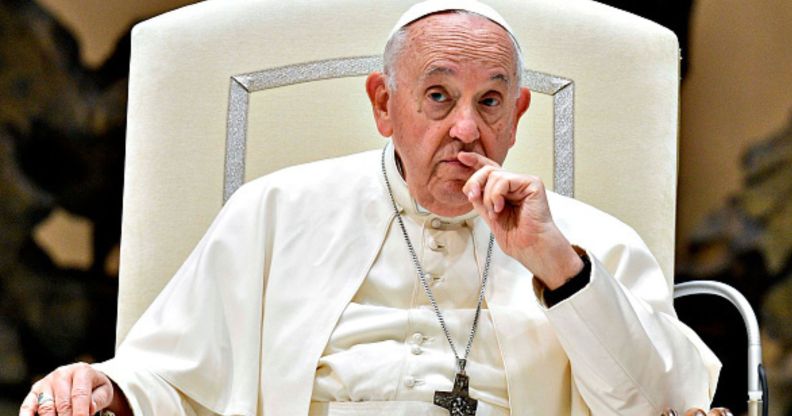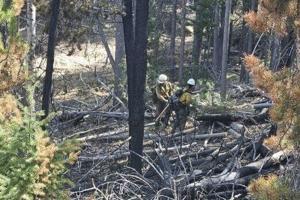Pope Francis, the head of the Catholic church, has died aged 88. Pope Francis has died and left behind an erratic legacy on his support for the LGBTQ+ community as head of the Catholic Church.His death was announced by Cardinal Kevin Farrell in a statement released by the Vatican on Monday (21 April).
In the statement he said: “Dearest brothers and sisters, with deep sorrow I must announce the death of our Holy Father Francis.“At 7.35am this morning, the Bishop of Rome, Francis, returned to the house of the Father.

His entire life was dedicated to the service of the Lord and His Church.“He taught us to live the values of the Gospel with fidelity, courage and universal love, especially in favour of the poorest and most marginalised.“With immense gratitude for his example as a true disciple of the Lord Jesus, we commend the soul of Pope Francis to the infinite merciful love of the One and Triune God.
”The pontiff became Pope in 2013 after Benedict XVI resigned. Pope Francis delivers his Urbi Et Orbi Blessing blessing from the balcony overlooking St. Peter’s Square on April 20, 2025 in Vatican City, Vatican.
(Vatican Media via Vatican Pool/Getty Images)In recent years, concern has increased about the health of Pope Francis and in February he was admitted to hospital for treatment for bronchitis. Later that month, after being diagnosed with bilateral pneumonia, the Vatican said he was in a ‘critical’ condition. His hospital stay ended on 23 March but his health remained delicate.
On Easter Sunday (20 April), the Pope greeted worshippers who gathered in the Vatican’s St Peter’s Square. Speaking to the crowds from the balcony of St Peter’s Basilica, he said: “Dear brothers and sisters, happy Easter.”What did Pope Francis say about LGBTQ+ rights?During his decade of papal service, Pope Francis oversaw a Catholic Church in flux on acceptance of LGBTQ+ people.
Francis made a number of statements and gestures aimed at pushing the church to be more welcoming to the LGBTQ+ community, but has remained regressive in many areas. He met frequently with many LGBTQ+ Catholics, those who minister to them and prominent advocates in the community. Pope Francis said being gay is “not a crime” before describing the criminalisation of LGBTQ+ people as “wrong”, he echoed these views when denouncing Uganda’s Anti-Homosexuality Act, saying “discrimination is a sin, and violence against the LGBTIQ communities is unacceptable”.
The pontiff also described being gay as a “human fact” and clarified he supports blessings for individual LGBTQ+ people – but not their unions.“That cannot be done because that is not the sacrament. I cannot.
The Lord made it that way. But to bless each person, yes. The blessing is for everyone,” he said.
“To bless a homosexual-type union, however, goes against the given right, against the law of the Church. But to bless each person, why not? Some people were scandalised by this. But why?”He also urged parents to love their LGBTQ+ kids, not disown them, and told parents of queer youth that God loves all his children just as they are.
Yet, at the same time, Pope Francis did not make changes to church teachings that condemn the lives of LGBTQ+ people, and encourage families to reject their queer children.Pope Francis has made statements in the past that supported LGBTQ+ people but others that seemingly condemned queer lives. (Getty)The Catechism of the Catholic Church, a text which contains dogmas and teachings of the church, still describes “homosexual acts” as “intrinsically immoral and contrary to the natural law”.
It also names “homosexual tendencies” as “objectively disordered”. Additionally, Pope Francis repeatedly spoke against marriage equality. In 2021, he said marriage is a sacrament, and the church doesn’t have the “power to change sacraments” because it’s “as our Lord established”.
While the Pope personally invited a group of trans people for COVID-19 vaccinations at the Vatican and met with members of the trans community during Pride Month 2022. In March 2023, he hit out at so-called “gender ideology”.He called it one of the “most dangerous colonisations” and said he believed discussions on gender “eliminates differences, and that erases humanity, the richness of humanity, both personal, cultural, and social, the diversities and the tensions between differences”.
Pope Francis also came under heavy criticism in the summer of 2024 for allegedly using the term “frociaggine” a number of times during meetings with bishops about allowing gay men to become priests. The term “frociaggine” is an f-pejorative in the Italian language, which roughly translates to the derogatory term, “f****t”.The Vatican released an apology, insisting that the Pope is a supporter of the LGBTQ+ community.
“As he stated on several occasions: ‘In the Church, there is room for everyone. Nobody is useless, nobody is superfluous, there is room for everyone. Just as we are, all of us’,” a spokesperson said.
“The Pope never intended to offend or express himself in homophobic terms, and he apologises to those who felt offended by the use of a term reported by others.”There have always been concerns over the health of Pope FrancisPope Francis – who was born Jorge Mario Bergoglio on 17 December 1936 in Buenos Aires, Argentina – was 76-years-old when he was elected pontiff in March 2013. He was the first pope from South America and the first from the Jesuit order.
He suffered a number of health issues throughout his life including having part of one of his lungs removed at age 21. He underwent a colon operation in 2021 and used a cane as well as a wheelchair in recent years due to mobility issues caused by knee pain. Pope Francis hinted multiple times that he might resign from the papacy if his health worsened.
(Getty)Pope Francis suggested more than once that – if his health took a turn for the worse – he may consider the example set by his predecessor Pope Benedict XVI and retire from the papacy. Benedict was elected pope in 2005 but resigned in 2013 over concerns about his old age as well as his health. After a time where he was known as Pope emeritus, he passed away on 31 December, 2022.
The Argentine pontiff said Benedict “opened the door” to future resignations and that he too would consider stepping down. He also admitted that because of his age and health limitations he felt the need to “preserve [himself] a bit in order to serve the Church, or decide to step aside”. How is the new pope chosen?It’s not unusual for religious leaders, including popes, to die in office.
Many will recall the huge crowds gathered on St Peter’s Square during Pope John Paul II’s final illness and the reporting on the sorrowful response worldwide after his passing. There are compelling theological reasons why a pope should remain in office until his death – he embodies the Church as a whole, as the successor to St Peter, the apostle.Pope Benedict XVI’s resignation in 2013 caught the assembled cardinals and the world off guard.
The last resignation of a pope was in 1415, and there had only been a handful of other cases of papal abdication in the history of the Catholic Church. Pope Francis led the funeral mass for Pope Benedict, who was his predecessor. (Getty)There have been important questions raised about the future of the papacy in the face of the changing realities of aging as the role has become more dynamic and burdensome with frequent, global travel as a requirement.
After all, the pope is the head of a religion with an estimated 1.3 billion worshippers across the globe. Technically, any baptised Roman Catholic male can be elected pope.
But, for centuries now, every pope has been selected from the College of Cardinals, the group casting the votes at the conclave on who will be the next Holy Father. When it’s time to select a new pope, every cardinal under the age of 80 travels to Rome to vote. Inside the Sistine Chapel, the cardinals write the name of their chosen candidate on a paper ballot, which is placed into a chalice to keep the vote as anonymous as possible.
After a pope dies or resigns, a group of Cardinals gather at the Vatican in Rome, Italy to decide the next head of the Catholic Church. (Getty)Four rounds of balloting are taken every day until a candidate receives two-thirds of the votes. The result of each ballot is counted aloud and recorded.
The public aren’t allowed to watch the voting in the Sistine Chapel, but they are made aware of whether there’s a new pope by watching the smoke that comes out of the Vatican’s chiminea. Ballots are burned after the votes. If no one receives the necessary votes, the ballots will be burned along with a chemical that makes the smoke black.
If the smoke turns white, there’s a new head of the church, and the new pope will address the crowds invariably gathered outside shortly. The post Pope Francis dies age 88, leaving behind a complicated record on LGBTQ+ issues appeared first on PinkNews | Latest lesbian, gay, bi and trans news | LGBTQ+ news..
Health

Pope Francis dies age 88, leaving behind a complicated record on LGBTQ+ issues

Pope Francis, the head of the Catholic church, has died aged 88. Pope Francis has died and left behind an erratic legacy on his support for the LGBTQ+ community as head of the Catholic Church. His death was announced by Cardinal Kevin Farrell in a statement released by the Vatican on Monday (21 April). In [...]The post Pope Francis dies age 88, leaving behind a complicated record on LGBTQ+ issues appeared first on PinkNews | Latest lesbian, gay, bi and trans news | LGBTQ+ news.















